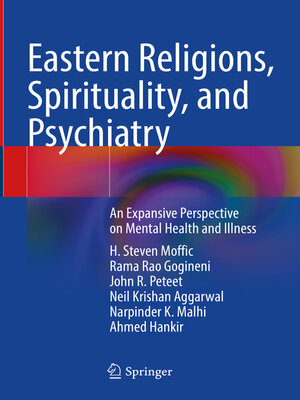Eastern Religions, Spirituality, and Psychiatry
ebook ∣ An Expansive Perspective on Mental Health and Illness
By H. Steven Moffic

Sign up to save your library
With an OverDrive account, you can save your favorite libraries for at-a-glance information about availability. Find out more about OverDrive accounts.
Find this title in Libby, the library reading app by OverDrive.



Search for a digital library with this title
Title found at these libraries:
| Library Name | Distance |
|---|---|
| Loading... |
This book provides a thorough, comprehensive, and accessible reference for all the major Eastern faith traditions and their intersection with psychiatry. Understanding Eastern religion is of paramount value to all mental health professionals, as there is a growing emphasis on religion and spirituality as a part of clinical cultural competence interventions, predominantly in North America and Europe. Additionally, there is rising membership in Eastern, Asian, and non-Semitic faith traditions in North America and Europe. Hence, more patients and clinicians belong to these non-Western faiths than ever before.
The volume is divided into five parts. Part 1 covers general issues, including principles of culture, religion, and spirituality in psychiatry, spirituality across the lifespan, child rearing, practice and faith, and how death and dying is approached in these Eastern traditions. Part 2 covers specific Eastern religions and spiritual traditions, including basic principles and research-based clinical aspects of Hinduism, Buddhism, Sikhism, Taoism, Zoroastrianism, Jainism, as well as Confucian philosophical ideas. Part 3 attempts to apply the importance of cultural humility to perspectives on the Eastern Traditions from Western Psychiatry. These include Christian, Muslim, and Jewish perspectives, not of expertise, but of explorations in learning. Part 4 covers specific social psychiatric perspectives, including the psychiatric harm that can come from caste divisions and cults posing as religions, but closes with a perspective on the Eastern connections to the relatively unknown, but unifying, Omnist perspective.
All mental health professionals seeking to expand their understanding of the essential belief systems of various Eastern religions and their connection with mental health will find Eastern Religions, Spirituality, and Psychiatry an invaluable resource.







